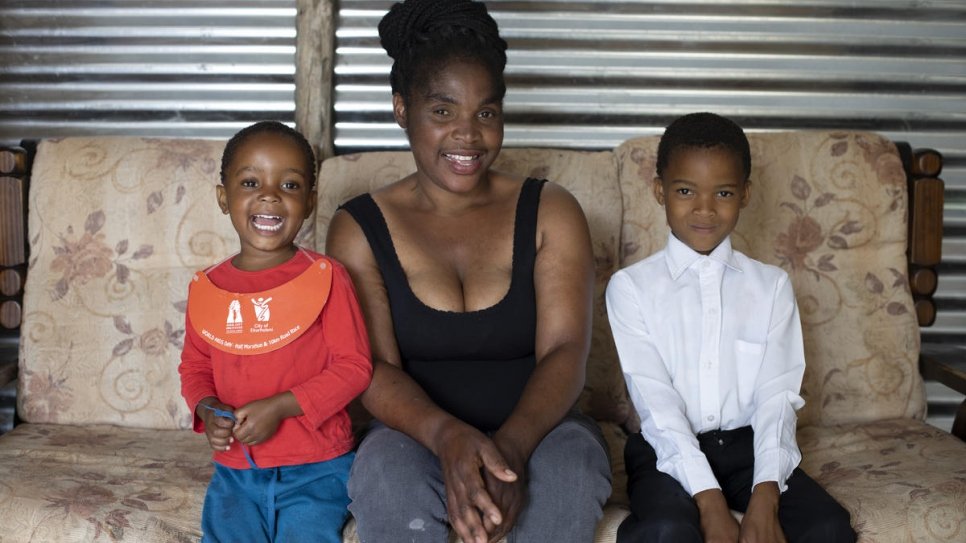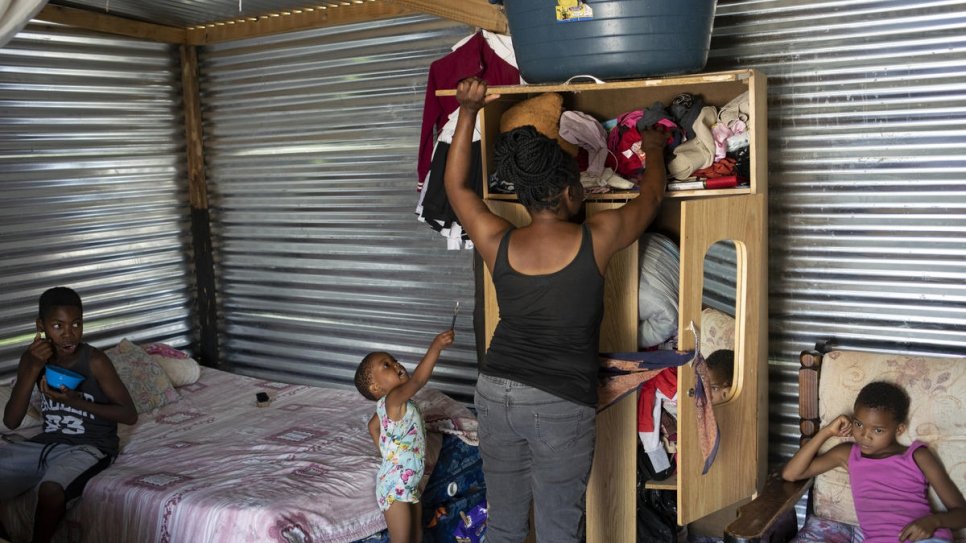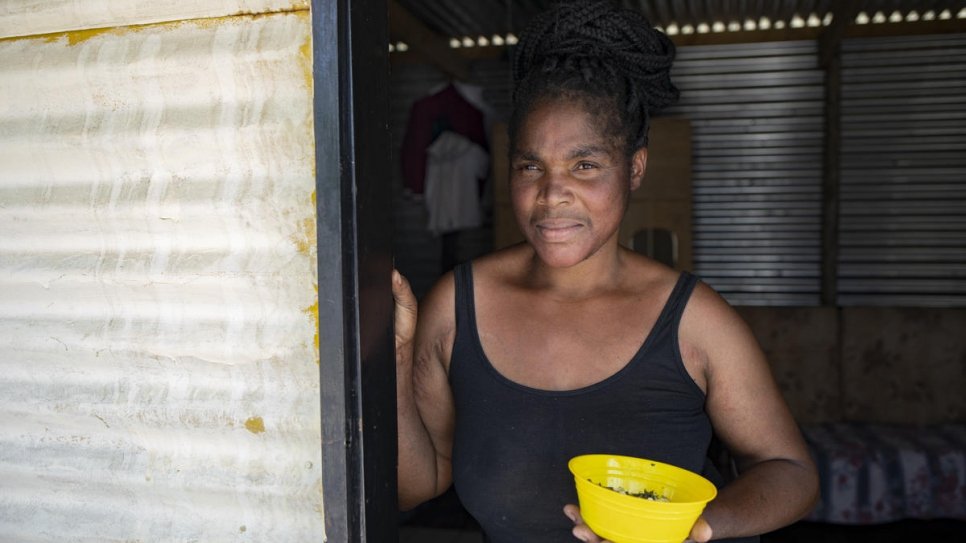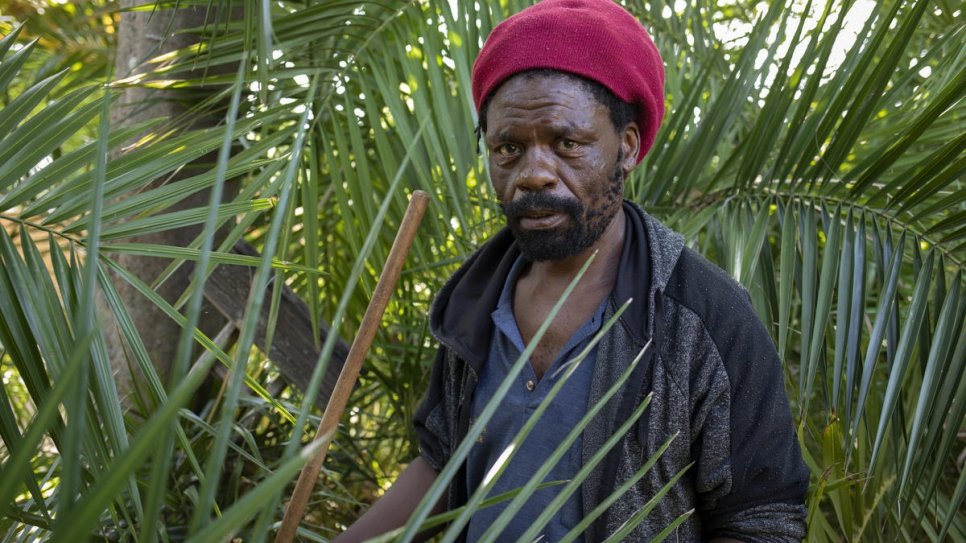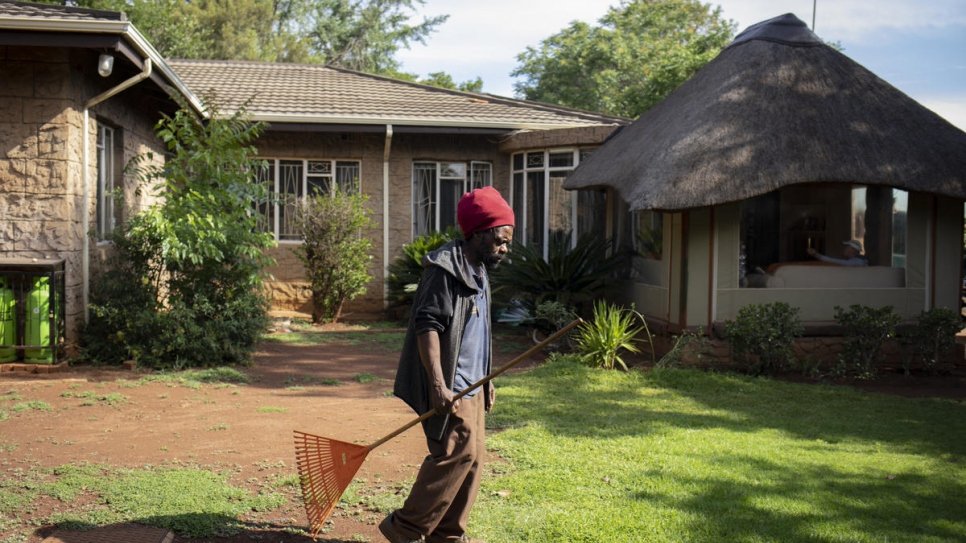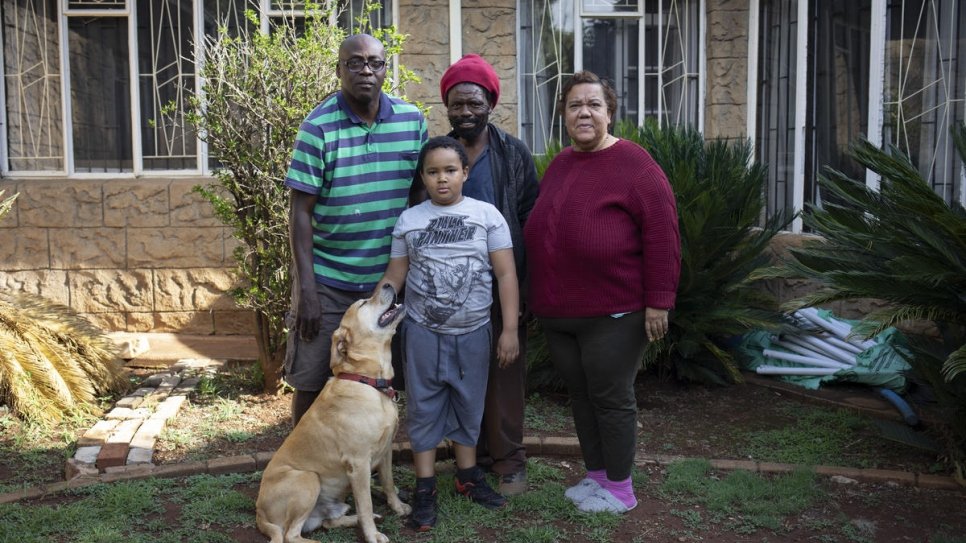Birth registration gaps leave South Africans in limbo
UNHCR is working with the South African government to help people at risk of statelessness obtain vital identity documents.
Mpho Modise stands by the entrance of her small tin shack in Brits, South Africa. She lacks identity papers as her birth was never registered.
© UNHCR/Hélène Caux
Mpho Modise can only guess her age and it embarrasses her.
“I would say I am about 33,” she says.
She is unsure because her birth in South Africa was never registered. Yet establishing her age is the least of her problems. Without a birth certificate, she risks becoming stateless because she cannot prove that she is a citizen.
Mpho believes she was around seven when she was abandoned with extended family in 1994 in Brits, a small farming town in the North West Province.
“One day mama went to work and never came home,” she said. “That was the last I ever saw her. She left nothing that identified who I am.”
The family that brought her up shared a surname with Mpho, but they could not get her a birth certificate. Mpho would watch forlornly as her new siblings went off to school every morning, while she stayed home to cook and clean. Denied school, she never learned to read or write.
“One day mama went to work and never came home. She left nothing that identified who I am.”
South Africa’s constitution guarantees basic education for every child, although some schools still require a birth certificate for admission, despite a court decision last year ordering public schools to admit all children, including those without certificates.
Around the world, millions of people are either stateless or at risk of statelessness. UNHCR, the UN Refugee Agency, in November, marked the sixth anniversary of its 10-year #IBelong campaign to end statelessness by 2024.
The World Bank estimates there are 137 million people like Mpho at risk of statelessness in Southern Africa. Lacking identity papers, they struggle to find work, gain an education, see a doctor, buy a house and land, or even get married. The result is often that they live on the fringes of society where survival is fraught with difficulty.
The COVID-19 pandemic has made resolving statelessness ever more urgent for those like Mpho without a safety net. But at the same time, it has made it harder for South Africa’s government to make progress in resolving cases of missed birth registration – but there is hope.
Last year, the government pledged to promote civil registration to ensure that South African nationals and refugees have ID documents.
“Since 2010, the government made it mandatory for parents to register their new-born babies within 30 days,” says Richard Sikhakhane, an official at the Department of Home Affairs (DHA), responsible for citizenships and passports.
He explains that failure to do so incurs penalties relating to late registration of birth. To avoid this many parents are complying with this legislation.
“Since 2010, the government made it mandatory for parents to register their new-born babies within 30 days.”
“We have seen a huge and improved difference in the number of children being registered at birth, with South Africa at 89 per cent of civil registration,” he adds.
For Mpho, her only recourse is to apply for late registration of birth. UNHCR’s legal partner, Lawyers for Human Rights, has been working closely with the DHA to resolve her predicament, although a backlog in files, coupled with the COVID 19 pandemic has negatively impacted progress.
In the meantime, UNHCR is working with the Government to undertake a study on the risk of statelessness in the country, pinpointing sources of statelessness and the estimated size of populations affected by statelessness.
Bianca Robertson, UNHCR’s Protection Officer based in Pretoria, notes that UNHCR will support capacity building on birth registration with civil registration officials, brief parliament and continue efforts to resolve cases like Mpho’s.
“We will also organize a media awareness campaign in collaboration with UNICEF to strengthen the late birth registration process,” adds Robertson.
Statelessness in South Africa echoes the country’s troubled history. Raphael Chauke, 55, fled apartheid in 1989 after first moving to Johannesburg with his mother from rural KwaZulu Natal as a baby. As a refugee in Zimbabwe, he obtained a scholarship to study industrial mechanics in Germany.
“It was in exile that I was recognized as a human being with rights,” he says.
He returned to South Africa after apartheid ended in 1994 on a travel document issued by the country’s embassy in Germany.
“That’s when my problems began,” he recalls.
The government denied him an identity document because he lacked a birth certificate, even though he went to the Department of Home Affairs with his elderly mother and even presented an affidavit from his primary school.
Paralyzed by his inability to steer his life forward, Raphael began a downward spiral.
“I became a casual labourer, begging at traffic lights for any job to survive,” he says.
If he was lucky, he would get two menial jobs a month, clearing brush from vacant plots or washing cars, earning about US$12 for a full day’s work.
Lacking identity documents, he missed out on a promising job at a platinum refinery in Johannesburg. He could not even vote and this was particularly painful in a country where so much had been sacrificed to make that right possible.
Now, instead of pursuing the career he trained for, he works as a gardener in an affluent suburb of the capital, Pretoria.
“I have been reduced to living like this despite everything I’ve done to prove that I am born of South African parents,” he says.
Mpho too lives on the fringes of society. She endured an abusive relationship with an older man because she feared being made homeless.
“I never loved him but because he was providing for me and I had nowhere to go, I stayed with him,” she says.
Eventually, she fled and since then, has worked at odd jobs to support her four children.
“I feel so discouraged by how my life has turned out,” says Mpho. “I lie awake at night thinking that I have condemned my children to lives with no future. What will become of them?”
UNHCR will continue its efforts to support Mpho and Raphael’s quest to receive identity documents. After all, it is for people like them that the campaign to end statelessness matters most.

